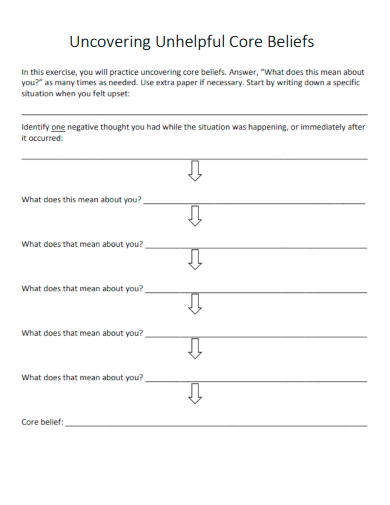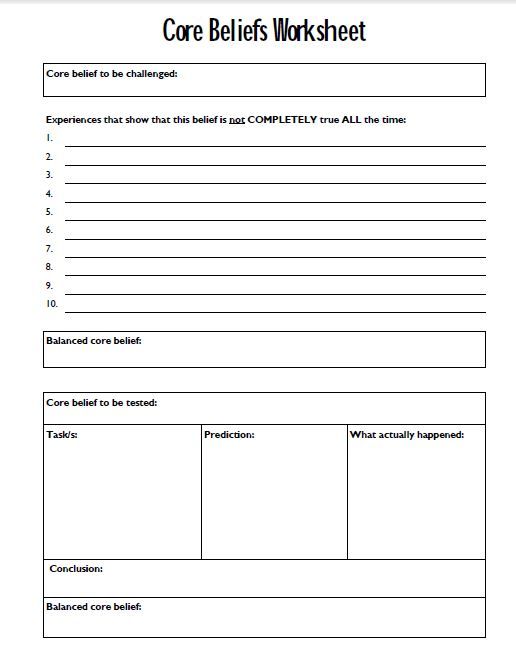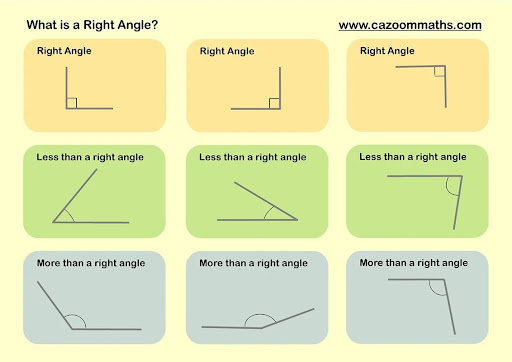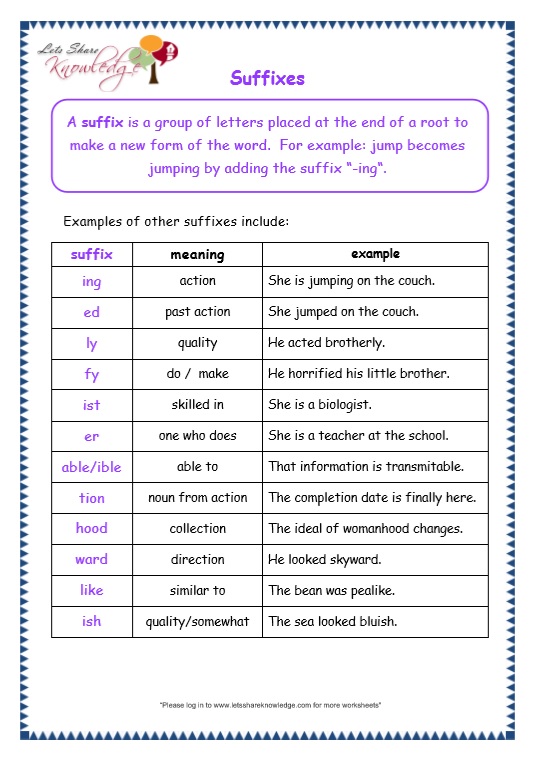Core Beliefs Worksheet: Discover Your Hidden Thoughts

Unlocking the Power of Your Core Beliefs
Our thoughts and behaviors are often influenced by our core beliefs, which are deeply ingrained and unconscious assumptions about ourselves, others, and the world around us. These core beliefs can either empower or limit us, depending on their nature. In this article, we will explore the concept of core beliefs, their impact on our lives, and provide a worksheet to help you discover your hidden thoughts.
What are Core Beliefs?
Core beliefs are fundamental assumptions that we hold about ourselves, others, and the world. They are often developed during childhood and are influenced by our experiences, environment, and upbringing. These beliefs can be positive or negative and are usually unconscious, meaning we are not aware of them.
Core beliefs can be categorized into three main types:
- Positive core beliefs: These are empowering and supportive, promoting a positive self-image, self-worth, and resilience. Examples include “I am capable and competent,” “I am worthy of love and respect,” and “I can achieve my goals.”
- Negative core beliefs: These are limiting and damaging, leading to self-doubt, anxiety, and fear. Examples include “I am not good enough,” “I am a failure,” and “I am unworthy of love and respect.”
- Neutral core beliefs: These are neither empowering nor limiting, but rather factual or observational. Examples include “I am a human being,” “I have strengths and weaknesses,” and “I make mistakes.”
How Core Beliefs Impact Our Lives
Our core beliefs play a significant role in shaping our thoughts, emotions, and behaviors. They influence our:
- Self-image: Core beliefs about ourselves can affect our self-esteem, confidence, and body image.
- Relationships: Core beliefs about others can impact our ability to form and maintain healthy relationships.
- Behavior: Core beliefs can drive our actions and decisions, leading to positive or negative outcomes.
- Emotions: Core beliefs can influence our emotional state, leading to feelings of happiness, sadness, or anxiety.
Discovering Your Core Beliefs
Identifying your core beliefs can be a challenging but rewarding process. By becoming aware of your core beliefs, you can:
- Recognize patterns: Understand how your core beliefs are influencing your thoughts, emotions, and behaviors.
- Challenge negative beliefs: Learn to reframe negative core beliefs and replace them with positive, empowering ones.
- Develop self-awareness: Gain insight into your values, strengths, and weaknesses.
To help you discover your core beliefs, we have created a worksheet below.
Core Beliefs Worksheet
Section 1: Identifying Core Beliefs

| Category | Core Belief | Is it Positive, Negative, or Neutral? |
|---|---|---|
| Self | I am capable and competent | Positive |
| I am not good enough | Negative | |
| I make mistakes | Neutral | |
| Others | People are trustworthy | Positive |
| Others are out to hurt me | Negative | |
| People have their own strengths and weaknesses | Neutral | |
| World | The world is a safe place | Positive |
| The world is a scary place | Negative | |
| The world is full of opportunities and challenges | Neutral |
Section 2: Exploring Core Beliefs
Choose three core beliefs from Section 1 and answer the following questions:
- What is the core belief?
- Where did this core belief come from (e.g., childhood experience, past trauma, cultural influence)?
- How has this core belief impacted my life (e.g., relationships, career, self-image)?
- Is this core belief positive, negative, or neutral?
- If negative, how can I reframe this core belief to make it more positive and empowering?
Section 3: Reframing Negative Core Beliefs
Choose one negative core belief from Section 2 and complete the following exercise:
- Write down the negative core belief.
- Identify the negative emotions associated with this core belief (e.g., anxiety, fear, self-doubt).
- Challenge this core belief by asking yourself:
- Is this core belief really true?
- Is there evidence to support this core belief?
- Would I say this to a friend?
- Reframe the negative core belief into a positive, empowering one.
📝 Note: Be patient and compassionate with yourself as you work through this exercise. Recognizing and challenging negative core beliefs can be a difficult process, but it is a crucial step towards personal growth and transformation.
By using this worksheet, you can gain insight into your core beliefs and begin to reframe negative ones. Remember that core beliefs are not fixed and can be changed over time with practice, self-awareness, and a willingness to challenge limiting thoughts.
As you embark on this journey of self-discovery, remember that you are not alone. Many people struggle with negative core beliefs, but by acknowledging and addressing them, you can break free from their limitations and unlock your full potential.
What are core beliefs, and why are they important?
+Core beliefs are fundamental assumptions that we hold about ourselves, others, and the world. They are important because they influence our thoughts, emotions, and behaviors, shaping our self-image, relationships, and overall well-being.
How do I identify my core beliefs?
+Identifying core beliefs can be done through self-reflection, journaling, and seeking feedback from trusted friends or family members. You can also use the Core Beliefs Worksheet provided in this article to help you discover your hidden thoughts.
Can I change my core beliefs?
+Yes, core beliefs can be changed over time with practice, self-awareness, and a willingness to challenge limiting thoughts. Recognizing and reframing negative core beliefs is a crucial step towards personal growth and transformation.
Related Terms:
- Core beliefs Worksheet PDF
- Challenging core beliefs PDF
- Core beliefs worksheet for Kids
- Core beliefs Worksheet free
- Identifying core beliefs Questionnaire PDF



